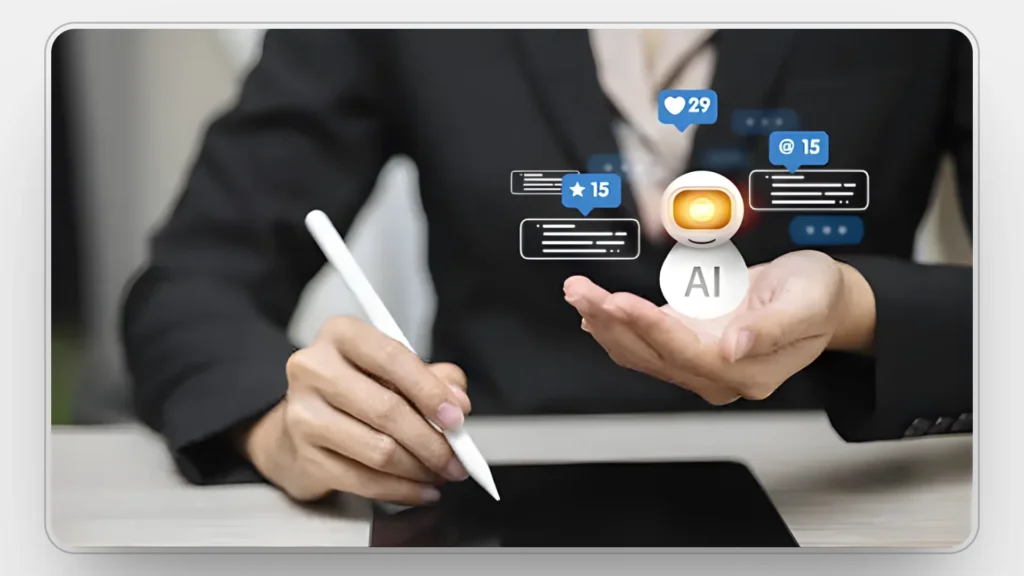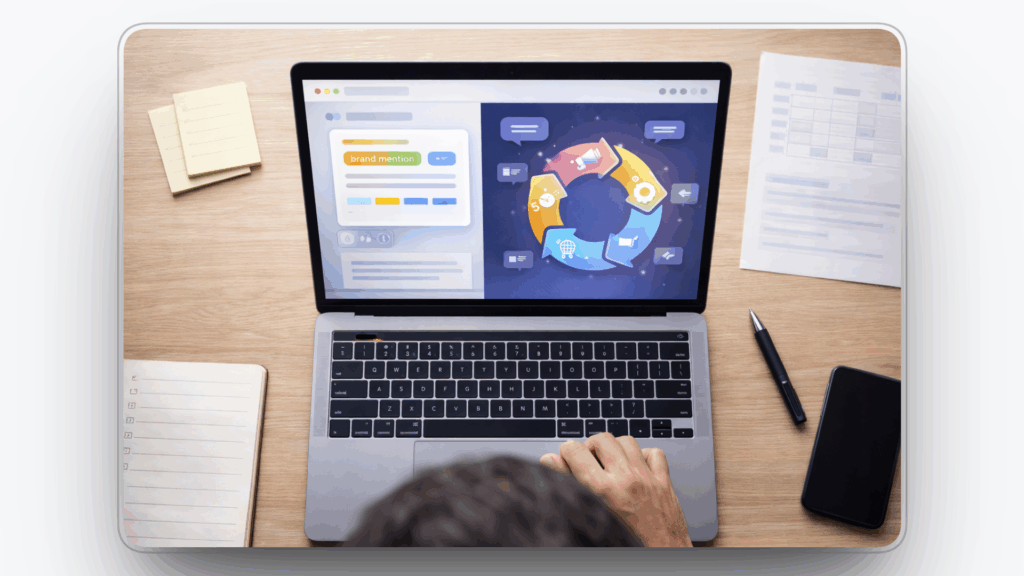- 34% of U.S. adults have used ChatGPT so measure AI answers not just blue links
- AI Overviews can cut clicks with drops reported up to about 79% so track citation coverage weekly
- Perplexity is around 22M monthly active users and a $400M Snap deal so cover all major models
- Capture the front end UI not just APIs because outputs can differ
- Retest weekly since LLM answers are volatile and you should monitor time to inclusion
Track brand mentions in AI search by logging when ChatGPT, Gemini, Claude and Perplexity name or cite your brand, benchmarking share of voice weekly and fixing gaps with schema, credible sources and focused content refreshes.
With Google’s AI Overviews rolled out at scale and used by hundreds of millions and 34% of U.S. adults having used ChatGPT, you can’t rely on blue link rankings alone, start measuring mentions and citations in AI answers and set a weekly review cadence. Early studies show AIO can depress CTRs when your brand isn’t cited, so tracking inclusion isn’t optional.
Marketers on Reddit and industry outlets report a real AI visibility gap: brands strong in Google often go unmentioned in AI answers; APIs don’t mirror front end results; answers shift frequently and missing or vague citations make attribution hard. Teams now treat mentions and citations as separate KPIs and log exact answer text, sources and competitor presence to see what AI is actually recommending.
In this guide, you’ll get simple workflow prompts → tracking → benchmarking → fixes to raise your AI mention share and citation coverage where buyers actually discover brands.
The AI Visibility Metrics Playbook
- Inclusion Rate (IR) by Model & Intent% of prompts where your brand is named or cited split by model (ChatGPT, Gemini, Claude, Perplexity) and intent cluster (commercial, comparison, informational); compute Wilson CI for stability.
- Citation Coverage (CC) & Type MixShare of appearances that include clickable attribution, broken down by citation type (homepage, product, resource, third party) and domain class (news, review, gov/edu).
- Answer Placement Score (APS)Normalized position of your mention inside the AI answer (first named, list rank, card prominence); weight earlier placements higher to model “recommendation priority.”
- Volatility Index (VI) of AnswersWeek over week Jaccard drift of the set of brands cited per prompt; flags unstable prompts/models where we check cadence must be higher.
- Source Authority Fit (SAF) GapWeighted authority of sources that win citations when you don’t (brand vs. competitor), mapped to topical graphs; exposes which evidence types/models prefer.
- Entity & Schema Resolution Score (ERS)Coverage of key entities (Organization, Product, AggregateRating, FAQ, HowTo, Offers) across your pages vs. what models surface; ties missing properties to inclusion gaps.
Mentions vs. Citations: What You’re Actually Measuring
In AI search, a mention is when the model names your brand in its answer; a citation is when the answer links to your domain as evidence. Track both per prompt and per model (ChatGPT, Gemini, Claude, Perplexity). At minimum, log: inclusion flag (Y/N), link URL(s), placement order (first/middle/end), competitor names, timestamp, model/version and locale. This lets you compute Inclusion Rate (mentions), Citation Coverage (linked appearances), Share of Voice and Answer Placement Score so you can see where you appear, how you’re attributed and what to fix.
Mentions vs. Citations Comparison Table
| Brand Mentions | Citations | |
| What it is | Brand named in the AI answer (no link required). | Your domain is linked as a source/attribution in the answer. |
| Primary KPI | Inclusion Rate (IR): % of prompts where you’re named. | Citation Coverage (CC): % of your appearances that include a link. |
| How to detect | Parse answer text → entity match (org/brand aliases). | Extract visible links → normalize domain → map to your properties. |
| Typical impact | Affects recall & preference (“who gets recommended”). | Drives click through & proof (traffic, trust, conversions). |
| Placement sensitivity | Higher weight if first named or early in the list. | Higher weight if primary source or repeated across sections. |
| Volatility | Can fluctuate with prompt phrasing and model updates. | More stable, but sensitive to evidence, freshness and authority. |
| Optimization levers | Category/comparison content, brand clarity, prompt coverage. | Evidence pages, schema/entities, digital PR (credible third party refs). |
| Validation | Human QA on entity resolution; watch false positives. | URL canonicalization; de duplicate redirects/UTMs; check anchor context. |
| Executive readout | SOV by model/intent + Answer Placement Score. | CC by link type (homepage/product/resource/third party) + quality mix. |
Your Tracking Stack: Models, Prompts and Cadence
Your stack should cover multiple models because inclusion varies by engine and mode. At minimum, track ChatGPT, Gemini, Claude and Perplexity; if your audience is searching first add Google AI Overviews and Copilot. For each model, standardize run settings (country, language, browsing/retrieval toggle) and log metadata (date/time, model/version) so results are comparable over time.
Prompts drive the signal. Create a canonical prompt set grouped by intent Category (“best AI visibility tools”), Comparison (“RankPrompt vs X”) and Solution/How to (“how to track AI mentions”). For robustness, generate 2–3 perturbations per prompt (synonym rewrites like “top/best/recommended”) and add geo/language variants where you sell. Store everything in a single source of truth (sheet or DB) with owners and testing cadence.
Cadence controls quality. Run weekly for core prompts (fast feedback on gains/losses), bi weekly for extended sets and monthly for long tail or experimental prompts. Build lightweight dashboards showing Inclusion Rate, Citation Coverage, Share of Voice and Answer Placement by model/intent, with a volatility indicator to highlight prompts that need more frequent checks.
Build a Buyer Intent Prompt Map
Start from the buyer journey and work backward. Category prompts reach problem aware users (“best tools to track AI mentions”), Comparison prompts reach solution aware users (“RankPrompt vs X”) and Solution/How to prompt convert evaluators (“how to get cited in AI answers”). Each cluster should reflect the exact language customers use to pull phrasing from sales calls, support tickets, community posts and SERP “People also ask.”
Quantify the map. For each prompt, assign business value (revenue potential), funnel stage and region/language. Add known competitors and pages on your site that should win (canonical evidence pages, comparisons, guides). Keep the map tight: 50–200 core prompts per market is enough for signal without noise; revisit quarterly to prune low value items and add new phrasing that surfaces in the wild.
Finally, wire the map to action. Each cluster should own at least one evidence asset (definitive guide or comparison), one schema pass (Organization/Product/FAQ/HowTo as relevant) and a short PR target list (domains/models already citing competitors). This makes the prompt map a living backlog, not just a spreadsheet.
Capture Real AI Answers (Front End, Not APIs)
Track what users actually see. API responses can diverge from front end answers, so perform browser based capture for each run. Render the page/UI, extract the full answer text, enumerate brands named and links shown and record placement order (first/middle/end). Normalize links (strip UTMs, resolve redirects) and store canonical domains to avoid double counting citations.
Make the data auditable. Save timestamps, model/mode/version, country and language. Keep weekly snapshots so you can compute volatility, time to inclusion and competitive displacement. Add a small QA sample (e.g., 5–10% of runs reviewed by a human) to catch entity resolution errors and mislabeled citations.
Design for scale and privacy. Use a headless runner with retry logic and rate controls; cache repeated prompts to avoid throttling and redact personal data by default. With clean, front end truth data flowing into a single repository, your dashboards will reflect real user experience and your optimization loop (schema, content, PR) will target the issues that move mentions and citations fastest.
Scoring & Dashboards: IR, CC, SOV, APS
Your dashboard should answer four questions at a glance: Are we present? (IR), Are we attributed? (CC), Are we winning vs. competitors? (SOV) and How strongly are we recommended? (APS). Compute Inclusion Rate (IR) as the % of prompts where your brand is mentioned or cited, segmented by model (ChatGPT, Gemini, Claude, Perplexity) and intent (Category/Comparison/Solution). Compute Citation Coverage (CC) as the % of your appearances that include a clickable link to your domain; also tag link type (homepage, product, resource, third party) to see what earns attribution.
Roll these into AI Share of Voice (SOV) by comparing your mentions/citations against the same set for competitors per model and per intent cluster. Add Answer Placement Score (APS) to weigh earlier placements more (e.g., first named = 1.0, mid = 0.6, end = 0.3). Pair these with Volatility (week over week Jaccard change of brands per prompt) and Time to Inclusion (TTI) after content/PR updates to understand stability and speed. Keep the exec view on one page: IR, CC, SOV, APS by model, top gains/losses, three fixes in flight.
Finally, make the numbers defensible. Store front end answer text, visible links, canonicalized domains, model/version, locale and timestamps for every run. Sample QA (5–10%) prevents entity resolution errors; annotate model changes and major content releases so trend shifts are explainable. When the data is consistent, small deltas (±2–3 pts IR/CC) become meaningful signals rather than noise.
RankPrompt Weekly AI Visibility Tracking
UseRankPrompt to turn this guide into a weekly workflow. It runs your prompt set across ChatGPT Gemini Claude Perplexity and AI Overviews and records what was said, who was cited and where your brand appears. You get simple dashboards that track inclusion citations placement and accuracy so you can spot gaps and fix them fast.
It also benchmarks rivals on the same prompts, captures the exact answer text and links and shows time to inclusion after updates. Export the results to your report and keep a steady cadence so small lifts become clear wins.
Why Brands Get Mentioned (Data Insights)
AI answers reward solution oriented, evidence rich content that cleanly resolves the user’s task. Pages that explain what to do and why it works (how to guide, decision frameworks, credible comparisons) tend to be surfaced and cited more than thin product copy. Clear entity resolution (brand, product, people, org relationships) helps models disambiguate “who” and “what” to recommend.
Freshness and authority matter. Recently updated resources with transparent sourcing, expert bylines and real examples/benchmarks are easier for models to trust and for answer generators to quote. Third party validation (industry publications, respected blogs, associations, .edu/.gov when relevant) often precedes inclusion, especially when a model wants cross site corroboration.
Model behavior differs. Some models lean to comprehensive “guides,” others to concise checklists; some weigh brand familiarity, others privilege niche authority sites. That’s why you track across multiple models, test prompt variants and compare what actually gets named and linked in each environment instead of assuming uniform behavior.
Close the Gap: Schema, Sources and PR
If you’re unmentioned or uncited, you likely have a proof gap (insufficient evidence pages), an entity gap (schema/structured data missing), or a source gap (few credible third party references). Fixing these systematically raises mention share and citation coverage.
1) Entity & Schema Coverage
- Implement: Organization, Product, FAQPage, HowTo, Review/AggregateRating, Offer (JSON LD).
- Fill critical props: name, description, brand, sku/id, audience, areaServed, author, dateModified, mainEntityOfPage.
- Canonicalize: stable URLs, consistent org/product names, ded up variants.
- Disambiguate entities: sameAs (Wikipedia/LinkedIn/Crunchbase), @id graph IDs.
- Validate at scale: batch schema tests, error budgets, CI checks on deploy.
2) Evidence Pages (Citable Assets)
- Page types: task “How to”, comparison matrices, methodology/research notes, FAQs.
- Structure for extraction: H2/H3 outlines, bullets, tables, code/steps blocks, TL;DR.
- Link model ready artifacts: datasets, calculators, checklists; add FAQPage/HowTo schema.
- Freshness: datePublished/dateModified, changelogs, canonical references.
- Internal linking: route from nav and high authority pages; XML/HTML sitemaps updated.
3) Digital PR & Source Authority Fit
- Target domains cited in your niche; build a seed list from captured citation URLs.
- Pitch assets with unique data/methods; request contextual links to evidence pages.
- Track KPIs: new referring domains, topical trust (by category), Time to Inclusion, Competitive Displacement.
- Automate monitoring: alert on new citations; normalize and de dupe redirects/UTMs.
- Quarterly cycle: publish study → outreach → measure IR/CC lift per prompt/model.
FAQs
1) How is a “mention” different from a “citation”?
A mention is the brand named in the AI answer; a citation is your domain linked as evidence. Measure both mentions = presence, citations = proof/traffic.
2) Which metrics should I report weekly?
By model & intent: IR (Inclusion Rate), CC (Citation Coverage), SOV (Share of Voice), APS (Answer Placement Score), plus Volatility and TTI (Time to Inclusion).
3) Should I capture front end answers or APIs?
Front end. Store the rendered answer text, visible links, placement order, model/mode/version, locale and timestamp. APIs can diverge; the front end reflects user reality.
4) What’s the minimum viable prompt set?
50 to 200 prompts per market split into Category, Comparison, Solution/How to, each with 2–3 synonym perturbations and geo/language variants.
5) How do I improve citation rates specifically?
Publish evidence pages (how tos, comparisons, methods, data) with clean schema (FAQPage/HowTo/Organization/Product), keep them fresh and earn contextual links from already trusted third party domains.
6) How often should I retest?
Weekly for core prompts; bi weekly for extended sets. Increase cadence on high volatility prompts or after major content/PR updates.
7) How do I prove impact to stakeholders?
Attribute lifts using TTI (time from change → first inclusion) and CDR (Competitive Displacement Rate: % prompts where you replaced a rival). Show deltas in IR/CC/SOV/APS per model.
8) What schema/entities matter most?
Base graph with Organization, Product/Service, FAQPage, HowTo, Review/AggregateRating, Offer. Include @id, sameAs, canonical URLs and dateModified for freshness.
9) Any pitfalls to avoid?
Counting redirected/UTM’d links as multiple citations, ignoring locale/language effects, relying only on one model and not version tagging runs (you can’t explain changes later).
10) When should I prioritize PR over on site fixes?
When IR is decent but CC lags, or competitor citations cluster on a handful of authority domains. Targeting those sources with data led PR to close the “Source Authority Fit” gap.









